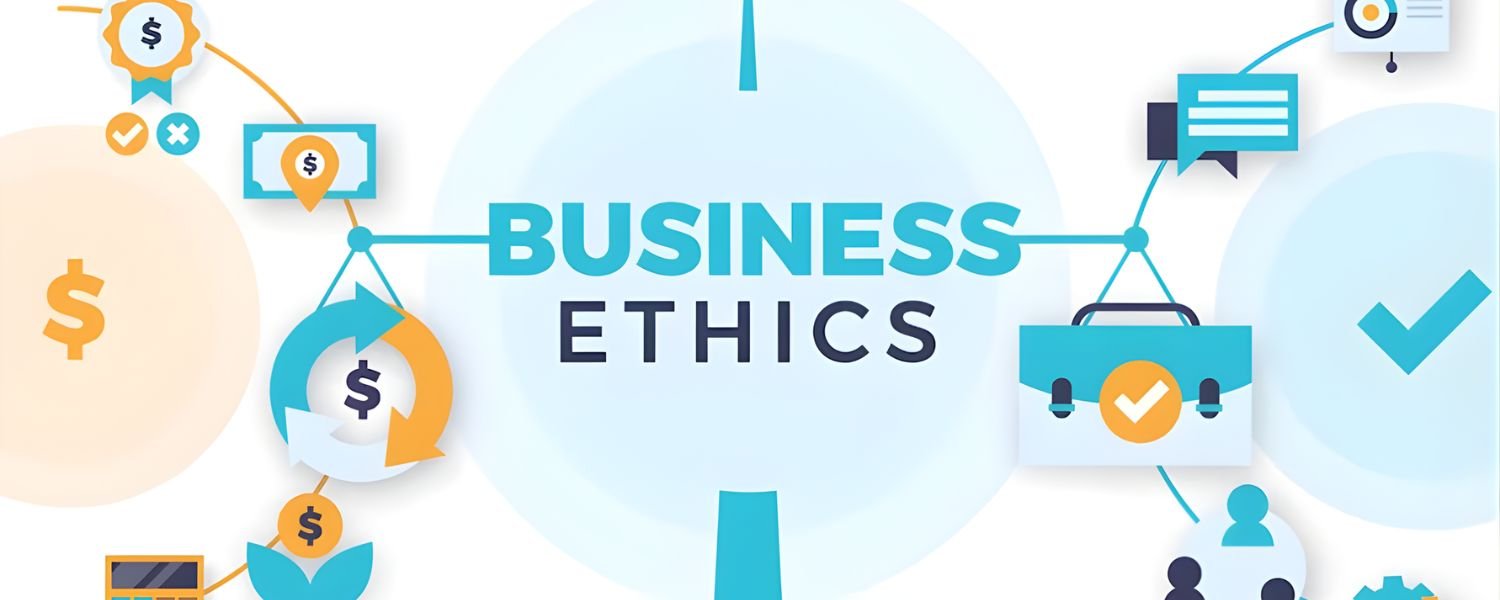Introduction
In today’s competitive business world, corporate culture is crucial for long-term success. At the heart of a thriving corporate culture is business ethics.
But what exactly is business ethics, and how do its elements shape the way companies operate? This guide explores the role of business ethics in molding corporate culture and how ethical behavior leads to sustainable success.
What is Business Ethics?

Business ethics encompasses the principles, standards, and moral guidelines that govern the conduct of individuals and organizations within the business environment.
These ethical frameworks ensure that business practices align with societal values and norms, fostering accountability, fairness, and transparency.
By adhering to these principles, organizations not only comply with legal requirements but also uphold moral standards that promote trust and integrity among stakeholders, including employees, customers, shareholders, and the broader community.
In this way, business ethics serves as a cornerstone for making decisions that balance organizational objectives with social responsibility, ultimately contributing to sustainable business practices and long-term success.
What is Ethical Behavior?

Ethical behavior in business refers to conducting operations in a manner that aligns with established moral principles and professional standards.
This involves acting with honesty, fairness, and respect in all interactions, both within the organization and with external stakeholders such as customers, suppliers, and business partners.
Ethical behavior requires businesses to avoid actions that are harmful, deceptive, or manipulative, and instead, promote transparency, accountability, and integrity in all business practices.
Upholding ethical behavior not only fosters trust and loyalty but also contributes to long-term sustainability and a positive corporate reputation.
The Path to Sustainable Success

For a business to achieve sustainable success, it must embed business ethics deeply into its corporate culture. Sustainable success isn’t just about profitability; it’s about creating long-term value for all stakeholders while maintaining ethical standards. When a company commits to ethical business practices, it builds trust, enhances its reputation, and fosters a positive work environment, which in turn drives long-term success.
The 12 Ethical Principles for Business Executives

Business executives play a critical role in shaping a company’s ethical standards. Here are twelve key principles they should uphold:
1. Integrity: Always be honest and transparent.
2. Fairness: Treat all stakeholders with fairness and respect.
3. Accountability: Take responsibility for your actions and decisions.
4. Respect: Honor the rights and dignity of others.
5. Transparency: Be open about business practices and decisions.
6. Responsibility: Act in the best interest of the community and the environment.
7. Compliance: Adhere to all relevant laws and regulations.
8. Confidentiality: Protect sensitive information and use it responsibly.
9. Courage: Stand up for ethical principles even when it’s challenging.
10. Leadership: Set a positive example for others to follow.
11. Equity: Ensure fair treatment in all business operations.
12. Stewardship: Manage resources responsibly and sustainably.
Ethical Business Practice Examples

Examples of ethical business practices can be seen in companies that prioritize fair labor practices, environmental sustainability, and transparent communication. For instance:
- Patagonia, an outdoor clothing company, is known for its commitment to environmental sustainability and fair trade practices.
- Ben & Jerry’s actively supports social justice causes and operates with a focus on fair trade.
These companies not only adhere to ethical standards but also integrate them into their business models, demonstrating how ethical behavior can enhance a company’s reputation and success.
Understanding Business Ethics

Business ethics involves understanding the moral principles that guide decision-making and behavior in the business world. It requires recognizing the impact of business activities on various stakeholders, including employees, customers, suppliers, and the community. By adhering to ethical business practices, companies can avoid legal issues, enhance their brand reputation, and foster a positive organizational culture.
What is Its Significance?
The significance of business ethics lies in its ability to build trust and credibility with stakeholders. When companies operate ethically, they are more likely to attract and retain talented employees, loyal customers, and supportive investors. Additionally, ethical practices help mitigate risks associated with legal disputes and regulatory penalties.
Components of Business Ethics
The basic elements of business ethics include:
1. Principles: Fundamental truths that guide behavior.
2. Standards: Specific rules and guidelines that must be followed.
3. Values: Core beliefs that influence how decisions are made.
4. Norms: Accepted behaviors and practices within an organization.
These key elements of business ethics work together to form a cohesive ethical framework that guides business operations and decision-making.
Why Are Business Ethics Important?
Business ethics are important for several reasons:
1. Trust Building: Ethical behavior fosters trust between a company and its stakeholders.
2. Reputation Management: Companies known for their ethical practices enjoy a positive reputation.
3. Risk Mitigation: Ethical practices help avoid legal and financial risks.
4. Employee Morale: An ethical work environment boosts employee morale and productivity.
5. Customer Loyalty: Ethical businesses attract and retain loyal customers who value integrity.
Types of Business Ethics

There are several types of business ethics that companies might focus on, including:
1. Corporate Social Responsibility (CSR): The commitment to operate in a socially responsible manner.
2. Environmental Ethics: Ensuring that business practices are sustainable and environmentally friendly.
3. Workplace Ethics: Maintaining fair treatment, respect, and integrity within the workplace.
4. Consumer Protection: Safeguarding the rights and interests of consumers.
Each type of business ethics plays a role in shaping a company’s culture and ensuring that it operates responsibly and ethically.
Conclusion
Business ethics are a fundamental aspect of corporate culture. By integrating ethical behavior into their practices, companies not only enhance their reputation and build trust but also contribute to sustainable success. Understanding and applying the basic elements of business ethics, as outlined in the Journal of Business Ethics book, can lead to a more responsible and successful business environment.
For individuals and businesses exploring small business ideas for women or those interested in Fabian entrepreneurship, the principles of business ethics are essential. They ensure that new ventures start with a solid foundation of integrity and responsibility.
Similarly, the qualities of an entrepreneur and the entrepreneurial path are strengthened by a commitment to ethical standards, which help guide decisions and actions in the business world.By focusing on ethical practices and principles, businesses can achieve lasting success and make a positive impact on their stakeholders and society at large.
For more business-related blogs, Subscribe to us Now!
FAQ
Q. What is business ethics?
A. Business ethics refers to the principles and standards that guide the behavior of individuals and organizations in the business world. It ensures that business practices align with societal values and norms, promoting honesty, fairness, and integrity.
Q. Why is business ethics important for corporate culture?
A. Business ethics are crucial for corporate culture because they foster trust, enhance reputation, and guide behavior. A strong ethical framework helps build a positive work environment, attract and retain employees, and maintain good relationships with customers and stakeholders.
Q. What are the key elements of business ethics?
A. The key elements of business ethics include principles (fundamental truths), standards (specific rules), values (core beliefs), and norms (accepted behaviors). These elements collectively guide ethical decision-making and behavior within an organization.
Q. Can you give examples of ethical business practices?
A. Examples of ethical business practices include fair labor practices, environmental sustainability initiatives, and transparent communication. For instance, Patagonia’s commitment to environmental sustainability and Ben & Jerry’s support for social justice causes are examples of ethical practices in action.
Q. What is ethical behavior in business?
A. Ethical behavior in business involves conducting activities honestly, fairly, and respectfully. It includes making decisions that are morally sound, avoiding deception, and being transparent in interactions with stakeholders

